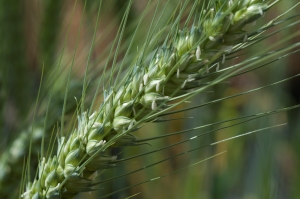|
Western Australia - Variety selection and sowing date important considerations under future climate scenarios
Australia
February 25, 2020

Optimal flowering periods for wheat in WA are likely to occur earlier under future climate scenarious. Photo by Brad Collis. © GRDC
- The optimal flowering period for wheat varies depending on geographical location, with distinct patterns evident across Western Australia
- Optimal flowering periods for wheat in WA are likely to occur earlier under future climate scenarios
- Depending on sowing opportunities, long-season varieties sown early would achieve higher yields under both current and future climates.
Greater consideration will need to be given to variety selection and sowing dates in the future, with research indicating climate change is likely to bring forward optimal flowering periods.
Results from research into the predicted impact of climate change on flowering periods will be presented by CSIRO’s Andrew Fletcher at the Grains Research and Development Corporation (GRDC) Grains Research Update, Perth, at Crown Perth on February 24 and 25.
Dr Fletcher and his colleague, Chao Chen, used Agricultural Production Systems sIMulator (APSIM) modelling to predict the current optimal flowering periods that minimised the effects of frost, heat and water stress on wheat yield, with additional calculations used to quantify the impacts of frost and heat on wheat yield.
This was combined with daily meteorological data for the period 1967 to 2017. The results showed large spatial variation in current opening and closing dates of the optimal flowering periods across the wheatbelt.
“The opening dates of the optimal flowering periods ranged from July 23 in the north-east of the wheatbelt to September 30 towards the south-west of the wheatbelt,” he said.
“Generally, the early opening dates corresponded to the early closing dates, which ranged from August 23 in the north-east to October 21 in the south-west.”
Dr Fletcher said it was important to understand how sowing date and variety could be combined to allow wheat to flower during its optimal flower period.
“These results will enable WA growers to determine the optimal flowering periods for their farms and to select a variety and sowing date combination to achieve the optimal flowering period for maximum yield,” he said.
Dr Fletcher’s research has predicted potential changes in future climate would affect the optimal flowering period of wheat.
“Optimal flowering periods occurred earlier under two different future climate scenarios,” he said.
“We used available climate change predictions to develop two scenarios: a ‘least-amount’ of rainfall decrease (the wet) and a large rainfall decrease (the dry) for the period 2061-2100, under a high greenhouse gas emission scenario.
“The shift in the timing of the optimal flowering periods was larger under the dry scenario, with opening dates of the period between 13 to 37 days earlier and closing dates occurring 21 to 36 days earlier.
“In future conditions, the same variety of wheat would need to be sown at similar dates to those adhered to for the current climate, to achieve the optimal flowering period.
“There is higher yield potential when sowing long-season varieties early to achieve the optimal flowering period in both current and future climate scenarios.”
With climate change expected to bring warmer temperatures, changed rainfall patterns, increased atmospheric carbon dioxide and more intense, extreme weather events, it is important for WA growers to understand how best to manage their cropping programs accordingly, Dr Fletcher said.
For more information or to register for the Perth and regional events, visit the GRDC website, or contact convenor the Grain Industry Association of WA (GIWA) on 08 6262 2128 or visit researchupdates@giwa.org.au.
More solutions from: GRDC (Grains Research & Development Corporation)
Website: http://www.grdc.com.au Published: February 25, 2020 |